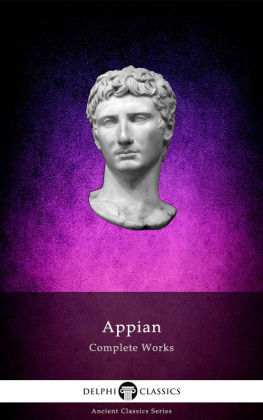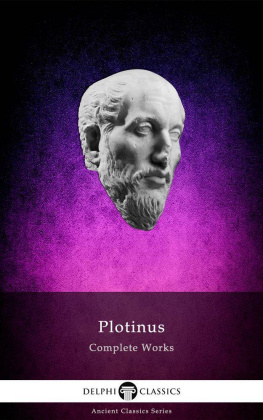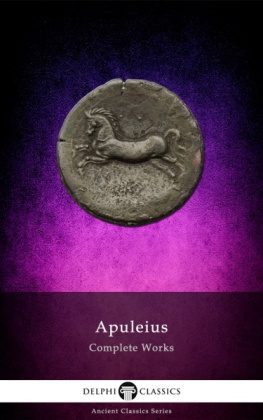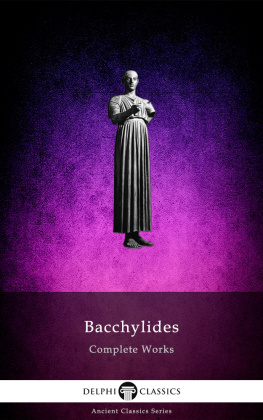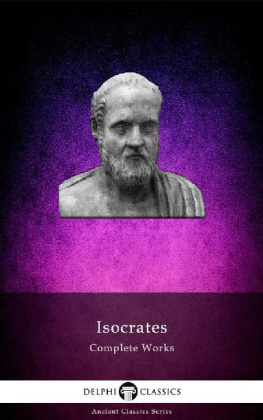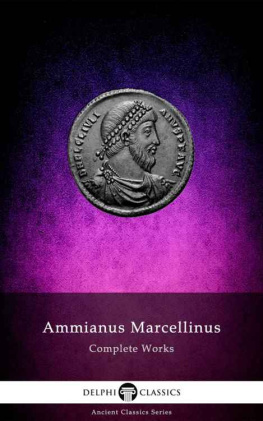The Complete Works of
EURIPIDES
(c. 480406 BC)

Contents

Delphi Classics 2013
Version 1

The Complete Works of
EURIPIDES
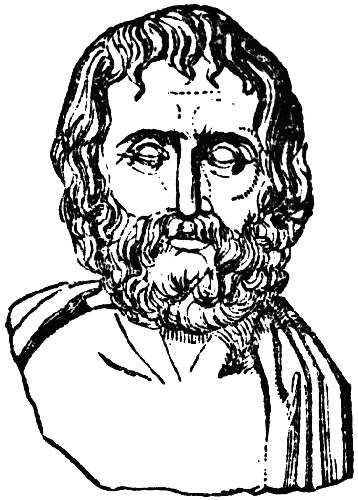
By Delphi Classics, 2013
COPYRIGHT
Complete Works of Euripides
First published in the United Kingdom in 2013 by Delphi Classics.
Delphi Classics, 2013.
All rights reserved. No part of this publication may be reproduced, stored in a retrieval system, or transmitted, in any form or by any means, without the prior permission in writing of the publisher, nor be otherwise circulated in any form other than that in which it is published.
Delphi Classics
is an imprint of
Delphi Publishing Ltd
Hastings, East Sussex
United Kingdom
Contact: sales@delphiclassics.com
www.delphiclassics.com
The Translations

Euripides was born on Salamis Island in c. 484 BC and he was the son of a retailer that lived in a village near Athens. Upon the receipt of an oracle saying that his son was fated to win crowns of victory, Mnesarchus insisted that the boy should train for a career in athletics, though he was destined to win theatrical victories instead.
ALCESTIS

Translated by Theodore Alois Buckley
Alcestis was first produced at the City Dionysia festival in 438 BC as the final part of a tetralogy of unconnected plays in the competition of tragedies, for which Euripides won second prize. It is most likely the oldest surviving work by Euripides, although at the time of its first performance he had been producing plays for seventeen years.
The drama concerns the unusual bargain arranged for King Admetus in return for a longer life. Admetus was granted by the Fates the privilege of living past the allotted time of his death. Apollo wished to repay Admetus hospitality and so offered him this gift. However, it came with the condition that Admetus must find someone to take his place when Death came to claim him. At the time of his death, he had still not found a willing substitute. Even his father, Pheres, was unwilling to volunteer, believing it was ludicrous that he should be asked to give up the life he enjoyed so much to humour the strange arrangement. Finally, Admetus devoted wife Alcestis agreed to be taken in his place, as she wished not to leave her children fatherless or be bereft of her husband. The drama focuses on Alcestis sacrifice and the effect it has on her family and the other characters, with a subtle exploration of male and female differences in Euripides contemporary society.

Alcestis and Admetus, as depicted in an ancient Roman fresco, 4579 CE

Hercules Wrestling with Death for the Body of Alcestis by Frederic Leighton, 1870
CONTENTS

Bust of Euripides Roman copy after a Greek original, c. 330 BC
PERSONS REPRESENTED.
APOLLO.
DEATH.
CHORUS OF PHERANS.
ATTENDANTS.
ALCESTIS.
ADMETUS.
EUMELUS.
HERCULES.
PHERES.
THE ARGUMENT.
Apollo desired of the Fates that Admetus, who was about to die, might give a substitute to die for him, that so he might live for a term equal to his former life; and Alcestis, his wife, gave herself up, while neither of his parents were willing to die instead of their son. But not long after the time when this calamity happened, Hercules having arrived, and having learned from a servant what had befallen Alcestis, went to her tomb, and having made Death retire, covers the lady with a robe; and requested Admetus to receive her and keep her for him; and said he had borne her off as a prize in wrestling; but when he would not, he unveiled her, and discovered her whom he was lamenting.
ALCESTIS
APOLLO.
O mansions of Admetus, wherein I endured to acquiesce in the slaves table, though a God; for Jove was the cause, by slaying my son sculapius, hurling the lightning against his breast: whereat enraged, I slay the Cyclops, forgers of Joves fire; and me my father compelled to serve for hire with a mortal, as a punishment for these things. But having come to this land, I tended the herds of him who received me, and have preserved this house until this day: for being pious I met with a pious man, the son of Pheres, whom I delivered from dying by deluding the Fates: but those Goddesses granted me that Admetus should escape the impending death, could he furnish in his place another dead for the powers below. But having tried and gone through all his friends, his father and his aged mother who bore him, he found not, save his wife, one who was willing to die for him, and view no more the light: who now within the house is borne in their hands, breathing her last; for on this day is it destined for her to die, and to depart from life. But I, lest the pollution come upon me in the house, leave this palaces most dear abode. But already I behold Death near, priest of the dead, who is about to bear her down to the mansions of Pluto; but he comes at the right time, observing this day, in the which it was destined for her to die.
DEATH, APOLLO.
DEA. Ah! Ah! Ah! Ah! What dost thou at the palace? why tamest here, Phbus? Art thou again at thy deeds of injustice, taking away and putting an end to the honors of the powers beneath? Did it not suffice thee to stay the death of Admetus, when thou didst delude the Fates by fraudful artifice? But now too dost thou keep guard for her, having armed thine hand with thy bow, who then promised, in order to redeem her husband, herself, the daughter of Pelias, to die for him?
AP. Fear not, I cleave to justice and honest arguments.
DEA. What business then has your bow, if you cleave to justice?
AP. It is my habit ever to bear it.
DEA. Yes, and without regard to justice to aid this house.
AP. Ay , for I am afflicted at the misfortunes of a man that is dear to me.
DEA. And wilt thou deprive me of this second dead?
AP. But neither took I him from thee by force.
DEA. How then is he upon earth, and not beneath the ground?
AP. Because he gave in his stead his wife, after whom thou art now come.
DEA. Yes, and will bear her off to the land beneath.
AP. Take her away, for I know not whether I can persuade thee.
DEA. What? to slay him, whom I ought? for this was I commanded.
AP. No: but to cast death upon those about to die.
DEA. Yes, I perceive thy speech, and what thou aimst at.
Next page
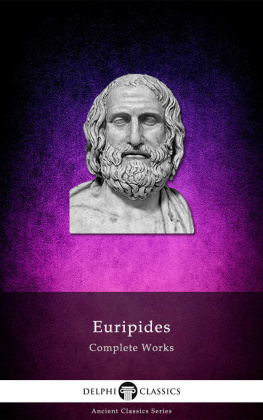
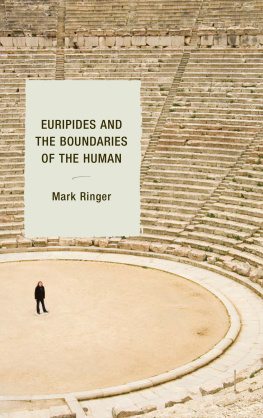


![Euripides - Classic Greek Drama: 10 Plays by Euripides in a Single File [NOOK Book]](/uploads/posts/book/43473/thumbs/euripides-classic-greek-drama-10-plays-by.jpg)


